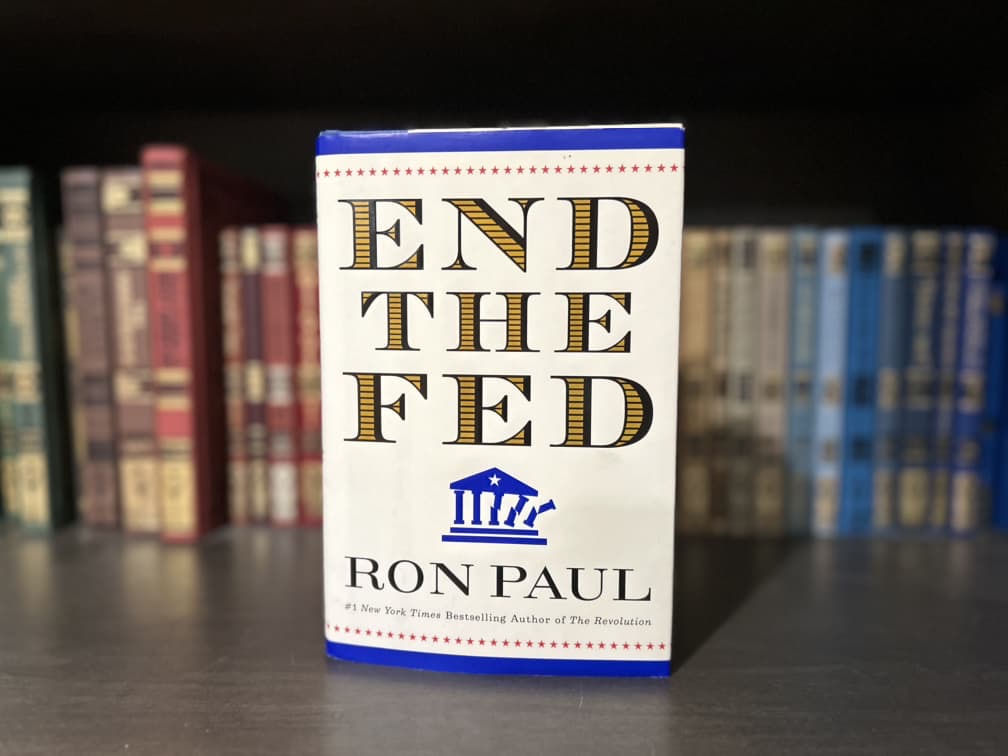Review of End the Fed
End the Fed is a 2009 book by the esteemed Congressman Ron Paul. In this book, Paul shows how the Federal Reserve System is unconstitutional and extremely detrimental to everyday Americans. I had a good understanding of this topic before reading the book, but there were three questions I had that were answered once I finished this read.

How has the Federal Reserve affected average American families?
The Federal Reserve severely affects the average American family in two important ways: the interest rate and printing money. The Federal Reserve, which for the most part cannot be controlled by any other part of the American government, has the power to change the national interest rate whenever and however it wants. The main issue with this power is that it doesn’t allow for proper free market corrections, thereby allowing unstable business decisions, which in turn lead to a collapse.
Think about it this way: if the economy isn’t booming and resources are scarcer than usual, it’s in everyone’s best interest for only the most productive businesses to borrow and use capital. In this scenario, the interest rate should rise so that only profitable companies can borrow and produce, thereby stimulating the economy naturally.
However, often for political reasons, the Fed will artificially lower the interest rate, which allows less productive and riskier businesses to borrow huge amounts of the scarce available capital. When many of those businesses fail, that capital is lost to the economy and further hurts the economy, creating a worse scenario than before.
The second and probably most serious action the Fed takes that affects the average American family is the continual printing of American dollars. This power is given completely to the Fed to be used as it wishes. In some cases, the dollars are not even physically printed, but merely created on computers and distributed through the economy.
It seems that the people who work for the Fed, the supposed “experts” in economics and monetary policy, think that more dollars mean a bigger and more robust economy. This is a pre-school level of knowledge on how the world works. Most children in elementary school could easily see, with a few examples, how printing more money does the opposite to the economy than intended. Printing money inflates the currency and, in turn, causes inflation in the economy.
The simplest way to describe how this works is an analogy along these lines: imagine a town where all the citizens have one piece of gold each that they use to buy goods. The price of most items will be stable based on the amount of currency in this economy. However, if five people in this town are suddenly given thirty pieces of gold each, they can now spend much more and buy more goods.
Now, since goods are scarcer, prices will rise; this does not affect those five rich people, but everyone else in the town suffers. Increasing the money supply always makes prices go up and hurts the majority of the population who don’t get access to the new money immediately.
By the time that new money trickles down to everyone else, they’ve already suffered too much that the little amount they receive via pay rises and the like is too little, too late. The rich who received the money first profited, and everyone else suffered.
Stimulus money works the same way: it inflates the economy without a solution being provided. If the economy is suffering, that means resources are not going where they are most needed. A downturn is a natural occurrence in a free market system that corrects the flow of resources.
Companies that waste resources and don’t produce effectively go out of business, while productive companies will benefit from the refocus of capital. Stimulus money in a struggling economy makes the situation worse by prolonging it. If people suddenly have a bunch of free money, they most often spend it immediately. This props up the wasteful companies and industries, thereby prolonging and increasing the sluggish state of the economy.
Additionally, since all that money was spent, it was not saved and therefore does not become usable capital. It’s when people save during an economic downturn that the economy can perk back up; now that it has capital, it can borrow on interest and create profitable and productive industries.
Does the average American have any remedies for these problems?
Unfortunately, there’s almost nothing the majority of Americans can do to stop this madness besides voting for an economically literate president. This is why the Federal Reserve is such a sinister organization: its every move affects every American citizen, almost always in a negative way, but they can’t do anything about it. The officials are unelected bureaucrats who benefit from their own actions.
Companies like banks, even if they’re failing due to incompetence, get propped up by the Fed, putting citizens’ money at even greater risk in the future. The Fed is kicking a proverbial bomb down the road with every action they take. Pretty soon, that bomb will be so unstable that it’s going to blow up, and we will all suffer because of it. The Fed must end; patriotism, common sense, and love for your neighbor demand it.
What can I do as a future father and leader?
Although I cannot directly influence the Fed to stop its foolish policies, I can take prudent actions to hedge myself and my future family against its effects. Smart financial actions taken at the right time will give me a cushion in the future when the economy suffers.
Part of the reason that the Fed’s actions are so disastrous is that most Americans aren’t in a stable financial situation. Huge amounts of debt, excess spending, and misguided priorities leave millions of families especially vulnerable to economic downturns. I don’t have to live like this.
My first action towards a stable financial future is to avoid debt like the plague. I’m not planning to go to college because I will not learn anything new about my prospective career in all those four years of school. Already, I’m avoiding tens of thousands of dollars in debt, at least, a weight that hangs on millions of people, preventing them from getting ahead or being stable.
If possible, the only debt I want to take on is a mortgage; I will not purchase a car or any other item on payments or credit without being able to pay it all with cash on the spot. This will greatly free up my finances throughout my entire life.
Even with my mortgage, I plan on working full time until I can enter law enforcement so that I can drop a large down payment, cutting my principal and interest rates by a huge margin. Along with borrowing on a fifteen-year mortgage instead of a thirty-year mortgage and overpaying on all my house payments, I’ll be able to save huge amounts of money in the long run.
I will also live below my means, not caring about how rich I look to other people. When it comes to physical goods, I want all my spending money to be invested in my house and property, not my clothes, jewelry, or cars. Who cares about what other people look like: I know that by saving as much as I can and spending as little as possible, I’m safe in the long run.
Finally, I will make sure to invest money every month into company and non-company retirement plans. My goal is to max out my company’s 401(k) and then move onto a Roth IRA so that by retirement, I’ll have enough money to do what I want with my time. It’s also possible that I’ll be able to retire early if I pay off my house on time, because then my mortgage payments can go into a transitionary retirement fund to tide me over till my actual retirement accounts are unlocked.
With this plan, I believe that my future family and I will be able to not only survive the Fed’s decisions but will also be able to thrive.
